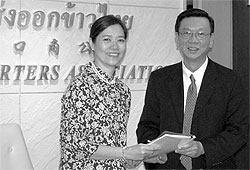
Chookiat Ophaswongse, the honorary president of the Thai Rice Exporters Association hands over the job to his successor Korbsook Iamsuri.
Bangkok Post | 14 Jan 2010
No call for foreign expertise, says rice chief Thailand should take a clear position on foreign investment in the rice industry as concern over food security is expected to increase pressure from abroad, an industry association chief says. With the recent rise in fossil fuel costs, food security has become a critical issue for many countries. The dynamic makes Thailand, a major producer and exporter of food, particularly rice, very attractive to overseas farm investors. Foreign investors, especially from the Middle East, have made many approaches to invest in businesses such as rice processing. "The government should consider carefully in opening the door wider for foreign investors, and which parties could be hit most by the inflow of foreign funds - farmers, traders or exporters," said Korbsook Iamsuri, the president of the Thai Rice Exporters Association. The government should also make clear whether it needs foreign expertise in rice business or not, she said. "In my perception, the Thai rice industry is strong and advanced with no need of technologies and know-how from outside. As the world's leading rice exporter, it has proven this," said Mrs Korbsook . Foreigners are not excluded from the rice processing business, but companies cannot be more than 49% owned by foreign shareholders, said Prasert Kosalwit, director-general of the Rice Department. In recent years, several foreign companies have sought permission from the government to operate rice processing businesses in Thailand, he said. Processing covers hulling, milling, colour sorting, grading and packing for sale, he said. "The Foreign Business Act prohibits [foreign involvement in] farming and paddy exports but not processing operations," he said. The government has to establish effective tools to prevent the use of Thai proxies and nominee shareholders, said Mr Prasert. Mrs Korbsook, also CEO of Kamolkij Co, one of the country's leading rice exporters, said inefficient logistics was a major problem for the Thai rice industry today. The government should improve logistics to help secure lucrative exports, she said. Last year, Thailand earned about 160 billion baht from exports of 8.57 million tonnes of rice. Exports are expected to pass 9 million tonnes this year. This year should bring a strong market and high prices, driven by lower global output, she said. The US Department of Agriculture forecasts that world paddy rice output this year will slip to 433.65 million tonnes, from 445.67 million last year. Accumulated world stockpiles are expected to fall to 85.9 million tonnes from 90.71 million tonnes. "Falling supply and concern over food security will increase rice transactions in government-to-government deals this year," she said. The Commerce Ministry should participate more in bids to sell rice to foreign governments, she said. The association this year will co-operate with the government to recover market share lost to other rice exporting countries in markets such as the Philippines.











